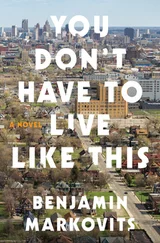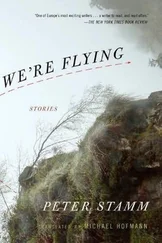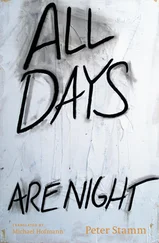Andreas thought of summers in his childhood. He pictured himself lying in his parents’ garden, reading a book under shady trees. He rode his bike to the river. He jumped from rock to rock in the almost dry riverbed, stumbled, and picked himself up. Then he lay in the tall grass at the edge of the woods up on the hill. He couldn’t remember how he had gotten there. A fire was burning almost invisibly, its flames lit and quenched by sunlight. Acrid smoke and the smells and sounds of the forest. Walks, alone or with the family, and always this tiredness and heaviness, that only got better when evening fell. Long evenings outside in a garden restaurant, or once again by the edge of the forest or the side of a lake. Parties that went on until it got cool, and nocturnal rides down the hill on his bike. And then, on the road in front of his parents’ house, endless conversations — about love, about life, about everything under the sun. The plans they had made. The world had been so big, then, so full of possibilities.
When Andreas awoke, it was eight o’clock. Delphine was sitting up. She was leaning against the wall, reading a women’s magazine she must have brought with her. He asked her if she had been awake a long time.
“I watched you sleep,” she said. “I think you were dreaming.”
“Something nice?”
“You’d know better than me.”
The cigarette machine downstairs was out of his brand. He walked out of the hotel. The air was still heavy and moist. He crossed the market square. The center of the village was little changed, one or two businesses had closed, and one or two new ones taken their place. Where the butcher’s shop had been before, there was now a store that sold tools for the do-it-yourselfer; the erstwhile dairy was now a children’s clothing shop. There were only a handful of people around, and no one Andreas knew. The people looked to him like extras in a film, faceless figures who had taken possession of his village, pretended they were walking their dogs, looking at shop windows, were on their way home, or to an evening in the social club. They seemed to feel at home here, knew their way around, and eyed him curiously or suspiciously, as though he were the stranger here, not they.
He looked at the houses, the streets, and the trees as though somewhere on them would be some traces of his life here. He saw only silent, apathetic surfaces. He leaned against one of the old chestnut trees on the market square, rubbed his hand over its dirty gray bark. He could picture himself walking this way as a child, going to school, going to music lessons, going home. The square was empty, and it was very quiet, but the air seemed somehow animated. Andreas felt strangely happy, perhaps it was memory, that strange feeling of happiness that disappeared the second you tried to focus on it. He tried not to think of anything, but he couldn’t manage. A couple of youths came across the square toward him, talking and laughing in loud voices. He pushed off the tree, and walked on to the station. The kiosk there was already shut. He heard a car accelerating away on the other side of the tracks, and then another immediately after. Across the road was a garden restaurant. Andreas went there, passed through the garden into the restaurant. He found a cigarette machine there; it was where he had always gone.
Delphine was sitting on the bed in the room, as though she hadn’t moved. She said she had thought he might have abandoned her.
“I would really be in trouble,” she said. “I don’t even know the name of this place. And I don’t speak a word.”
They walked around the village, and Andreas pointed out the important places of his childhood, the school, the church where he was confirmed, and the restaurant where he had used to meet his friends. He couldn’t imagine what the village looked like to someone seeing it for the first time, and who didn’t know its history, and the stories of its inhabitants.
The cemetery was locked. They walked on, crossed the railway line, and reached the swimming baths, and then Andreas’s parents’ house, where his brother was now living. There was no light on in the windows. They stood at the gate.
“Maybe they’re on holiday,” suggested Delphine.
“There used to be a place where the key to the basement was hidden,” said Andreas. Mechanically, he opened the gate. It squeaked, and Andreas remembered the noise, which hadn’t changed from his childhood. He passed through the garden, to the back of the house, and walked down the steps to the basement. Delphine remained at the top. The key was where it always had been, an ancient, rusty thing.
“Come on,” whispered Andreas.
It was dark in the basement, there was only one low window through which a little light came in. Andreas remembered the smell right away, a mixture of earth, mold, and heating oil. He took Delphine by the hand, and led her carefully up the steps. The connecting door to the ground floor was not locked. Andreas opened it, and stopped for a moment to listen.
On the kitchen table were a dozen flowerpots, and a little red plastic watering can. Next to it was a sheet of paper with instructions as to which plants needed watering once a week, and which more often.
“They must be on vacation somewhere,” he said. “We’d better not turn on any lights. If the neighbors see any, they’ll call the police.”
“I don’t like this. Let’s go,” said Delphine.
Andreas went into the sitting room. He counted the newspapers piled up on the coffee table, and said presumably they’d be back in the next couple of days. He went out onto the landing, and then up the stairs. Delphine stayed downstairs, and said she didn’t want to be arrested. Then she followed him upstairs after all.
The air was warm and stuffy. Andreas’s eyes had got used to the darkness, and he found his way around quite easily, though the window shutters were all closed. He stood in his former room, and looked around. The bed and desk were where they had been when they had been his, but the walls were covered with posters of footballers and pop stars who were unfamiliar to him. The room was tidy. Andreas remembered that they had always been made to tidy up before going on holiday. His mother had cleaned the whole house, as though she was afraid she might not come back, and leave dirt and untidiness behind.
Delphine stood next to Andreas.
“Come on,” she said. “This is wrong.”
“I grew up here,” he said. “This is my room.”
“It was your room, you mean,” said Delphine. “Now you’ve seen it. Can we go?”
“I don’t know my brother’s children very well,” said Andreas.
He had only met his niece and nephew on a couple of occasions. At their grandfather’s funeral they had been shy and awkward. And once, a few years ago, the whole family had visited him in Paris. He had booked a hotel for them, and taken them to museums and inexpensive restaurants. But he had mainly spoken to Walter and to Bettina. The children struck him as quiet and polite, but of no interest. They seemed bored when he explained or demonstrated something to them. They looked up at him briefly, and seemed not to hear what he was saying. In restaurants, they only picked dishes they were already familiar with, and they always seemed to be tired, or thirsty, or needing the lavatory. The idea that the family would live on in those individuals, that these were his descendants, his heirs, had always irritated Andreas. And now Maia was eighteen. He knew her age because she was born in the year he moved to Paris. Lukas was three or four years younger.
He should have been more engaged with the children, he thought. It was too late now. He was sure he meant no more to them than they did to him. Their peculiar uncle in Paris, whom their father always talked about with an undertone of anxiety in his voice. If he talked about him at all, that is. Andreas had never been close to his brother. Now he had the feeling of being very close to him, and at the same time, of losing him altogether. He was standing in an empty house.
Читать дальше












